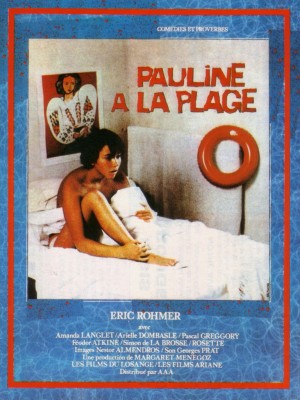| Reviews & Columns |
|
Reviews DVD TV on DVD Blu-ray 4K UHD International DVDs In Theaters Reviews by Studio Video Games Features Collector Series DVDs Easter Egg Database Interviews DVD Talk Radio Feature Articles Columns Anime Talk DVD Savant Horror DVDs The M.O.D. Squad Art House HD Talk Silent DVD
|
DVD Talk Forum |
|
|
| Resources |
|
DVD Price Search Customer Service #'s RCE Info Links |
|
Columns
|
|
|
Pauline at the Beach
A Kino Classics release licensed from MGM, the new Blu-ray offers a strong presentation of the film and a couple of good extras.
Near the beaches of Normandy, Pauline (Amanda Langlet) and her 30-ish divorced cousin Marion (Arielle Dombasie) arrive at their family's vacation home. On the beach, Marion reunites with ex-lover Pierre (Pascal Gregory), who still yearns for her, and his middle-aged acquaintance, Henri (Féodor Atkine). Henri, attracted to the beautiful Marion, invites them to his house for dinner.
There, as in an earlier conversation between the two cousins, love relationships are discussed. Marion desires a passionate relationship, one burning like a hot flame, while Pierre argues lasting relationships don't work that way, that they take time to develop properly. Henri, divorced like Marion, touts his uncomplicated lifestyle, unfettered by material possessions and committed relationships. Pauline, for her part, mostly listens, occasionally questioning the others' statements.
Later, they decide to go dancing at a rather run-down casino and, there, Pierre confesses to Marion that he's still crazy about her, but she only wants his friendship. Moments later, she and Henri are getting it on. Marion falls head over heels in love with Henri, but he's only interested in her body. When the opportunity arises, amidst this new relationship with Marion, Henri beds down with roaming candy vendor Louisette (Rosette), nearly getting caught in the act by both Pierre and Marion.
Pauline, meanwhile, has struck up a pleasant sexual relationship with local boy Sylvain (Simon de la Brosse), a relationship that the others generally disapprove of, mainly because in their selfishness each wants to steer needy, troublesome Pierre toward Pauline.
Rohmer's film basically contrasts these selfish, pretentious, and hypocritical adults with Pauline, who on the cusp of adulthood still has the face of a child but the body of a young woman. She's sexually active but essentially responsible and adult in her treatment toward the young boys she likes, while respecting herself in the process. She's not sanctimonious like the adults and is largely nonjudgmental. Contrastingly, Marion talks incessantly about love, thinking she's imparting wisdom upon Pauline but instead she merely exposes her own neuroses. Unlike Pauline, she lacks good judgment, jumping into a relationship with a user like Henri, and then is blind to his utter indifference toward her in every way except her body. (And even that he finds fault with, later calling Marion's body "too perfect.") A quote from Chrétien de Troyes at the beginning of the film pretty much telegraphs the story: "A wagging tongue bites itself" (or, as the subtitles in this version less elegantly put it, "He who talks too much does wrong").
Rohmer's style is as straightforward as the film's screenplay: long static shots, often on one actor while the other half of the conversation is out of camera range, allowing the viewer to study the on-camera performer's emotions. The sexuality (and discussion about it) is refreshingly frank, even matter-of-fact compared to prudish American and British films. Indeed, Rohmer's films are the antithesis of high-concept Hollywood films. Other than a brief scuffle lasting all of three seconds, it's all mature talk probing human nature. The acting by all is excellent, so good that the entire film seems improvised when it fact it was fully scripted by its director.
Video & Audio
Kino's Blu-ray, licensed from MGM, looks very good, with strong detail and, based on comparisons over at DVD Beaver, with truer colors than an earlier Region B release. (The movie, on my projection system at least, doesn't look nearly as dark as their frame grabs would suggest.) The Dolby Digital mono audio is also fine, as are the optional English subtitles. The disc itself is region A encoded.
Extra Features
Supplements include a French trailer (regrettably presented without English subtitles) and a 15-minute interview with Rohmer about the film which includes some footage not in the final cut of the film.
Final Thoughts
An excellent, honest look at sexual and emotional attraction and the self-destructiveness that often follows, Pauline at the Beach is a DVD Talk Collector Series title.
Stuart Galbraith IV is the Kyoto-based film historian and publisher-editor of World Cinema Paradise. His new documentary and latest audio commentary, for the British Film Institute's Blu-ray of Rashomon, is now available.
|
| Popular Reviews |
| Sponsored Links |
|
|
| Sponsored Links |
|
|
| Release List | Reviews | Shop | Newsletter | Forum | DVD Giveaways | Blu-Ray | Advertise |
|
Copyright 2024 DVDTalk.com All Rights Reserved. Legal Info, Privacy Policy, Terms of Use,
Manage Preferences,
Your Privacy Choices | |||||||













